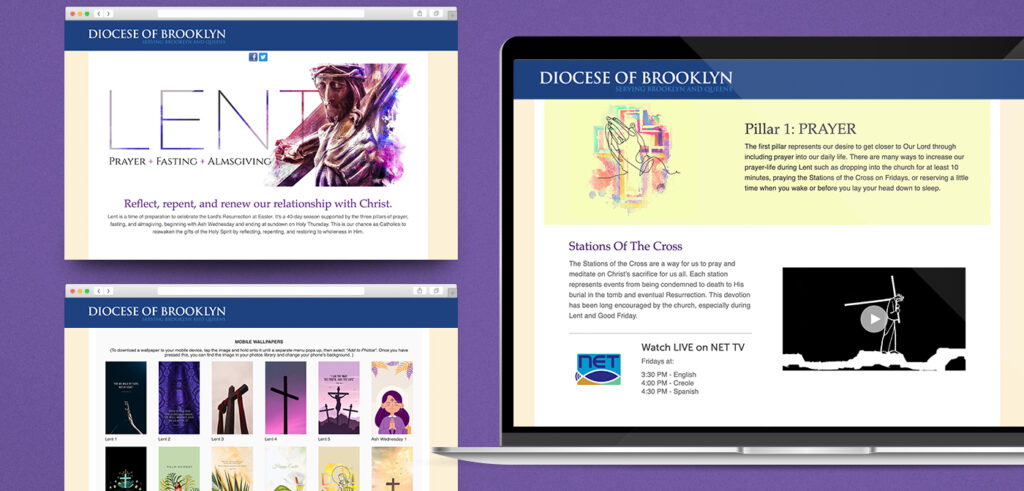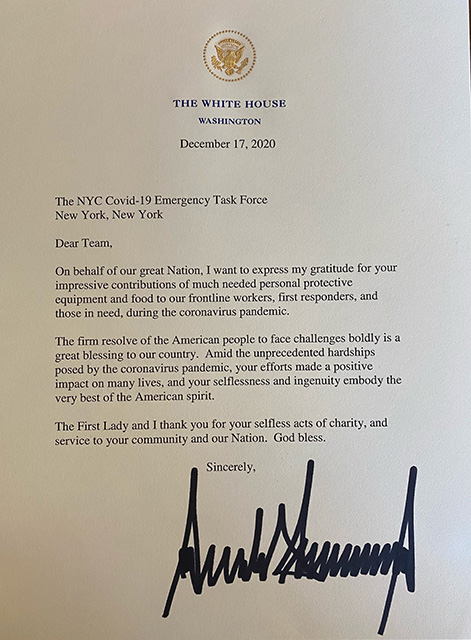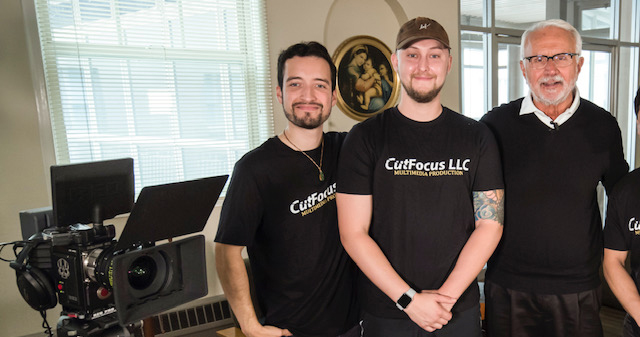
On January 24th, DeSales Media celebrates the feast of our founder, St. Francis de Sales. Although he’s not as famous a saint as the Francis from Assisi, St. Francis de Sales was a revolutionary preacher and advocate for the laity at a critical time in the Church’s history. Francis de Sales’ skills as a clear thinker, a pastoral and insightful spiritual mentor, and an intelligent writer were gifts to his flock in the diocese of Geneva and beyond.
Who is Francis?
Let’s start with the basics. Francis de Sales was the definition of a Renaissance man. And not just because he lived during the Renaissance. He was a multi-talented young gentleman from a noble family, with a great love for education.
From the age of 13 to 21, Francis studied at the Jesuit College of Clermont in Paris, studying the liberal arts in addition to fencing, riding, and dancing—classes that were prerequisite to acceptance in polite society!
After graduation, he studied law and theology at the University of Padua. His father wanted him to begin practicing as a lawyer, but Francis privately vowed to become a priest. Despite his father’s insistence (and even setting up a betrothal for Francis! Talk about a Helicopter Parent.) Francis refused marriage and was eventually ordained a priest in 1593.
Francis spent most of his priestly career in the Franco-Swiss city of Annecy, after a brief and harrowing stint in Geneva. As the seat of Protestant reformer, John Calvin, Geneva was the capital of the Calvinist movement and was hostile to Catholics. In 1602, Francis was appointed bishop of Geneva, but he ruled from the nearby town of Annecy, since Calvinists had completely overtaken Geneva.
As bishop, Francis de Sales displayed a great love and devotion to his flock. He began to publish his spiritual writings. His most famous— Introduction to the Devout Life —was a groundbreaking book, as it was addressed not to other clergy or religious, but to regular men and women trying to live lives of holiness in the world.
In their welcome packet, each DeSales Media employee receives a copy of Francis de Sales’ Introduction to the Devout Life . So, as a celebration of this unique and powerful saint, we present some key takeaways from Introduction to the Devout Life .
Follow the Revolution
In the first chapter of Introduction to the Devout Life , Francis de Sales states his intended audience pretty clearly:
“My purpose is to instruct those who live in town, within families, or at court, and by their state of life are obliged to live an ordinary life as to outward appearances” (22).
The Protestant reformers—Luther, Calvin, Zwingli—all took advantage of contemporary technological advancements to bring about their populist-fueled reforms.
Each of these three major reformers relied on the new printing press technology to create cheap, easily-circulated pamphlets and books. Less than a hundred years old, the Gutenberg printing press created a whole new genre of religious pamphlets, easily distributed between households.
Preachers could extend their influence beyond the boundaries of their pulpit. They addressed their messages not to the kings or the powerful, but to those at the bottom of the hierarchy of power: those who were truly in need of and looking for good news. One of the leading minds of the Catholic Reformation, also known as the Counter-Reformation, Francis de Sales addressed his written preaching to the exact same audience.
He addressed those living “amid the hazards of this mortal life.” The popularity of his book over the past 400 years is a reminder that success in ministry is found by meeting the congregation where they are—by following trends and finding ways to make God’s message known within them.
Use Words Wisely
As a lawyer, Francis was highly aware of the power of words (and the importance of precise language).
What we say affects how we love. The words that we use always affect our relationships with others. The words that we say affect how we depict and encounter our relationship with God.
In Introduction to the Devout Life , Francis de Sales focuses on pursuing virtue in our language. He writes at length on our how language can affect others, particularly those less wise or less powerful than us
“for even if you do not speak with an evil intention those who hear it may take it in a different way. An evil word falling into a weak heart grows and spreads like a drop of oil on a piece of linen cloth” (182).
Francis de Sales asks us to take responsibility for our speech. Any human action can have unintended consequences, but particularly our words. How many times have we been hurt by an off-handed remark from a friend, spouse, or sibling? How many times have we realized too late an unintended connotation of a quick comment?
The more we practice speaking intentionally and thoughtfully, the less likely we are to cause harm to others.
De Sales would certainly have a few things to say about Twitter. He writes:
“to scoff at others is one of the worst states a mind can be in. … Nothing is so opposed to charity, and much more to devotion, than to despise and condemn one’s neighbor. Derision and mockery are always accompanied by scoffing, and it is therefore a very great sin” (183).
Twitter has become a famously hostile space of “hot takes” and “canceling” where mocking and scoffing are the chief forms of address. It’s a space that creates echo chambers of derision and hardening of our own views.
Studies show that the anonymity of the internet overcomes inhibitions, and we say what we might not say to someone in person, if they could see us while we said it—or if we could see them while we said it.
But the words we say online shape the way we think, the way we act, and the way we love others. I appreciate that emails now position the contact’s photo next to his or her name, visible while I type a message to them. It helps me remember who is on the other end of a message I write and how they might potentially receive it.
The words we use matter—how are our own words, online and IRL, teaching us to love others?
Although Francis de Sales was the Bishop of his diocese, and a busy man, he never failed to show care to those he served through the written word. The next time we approach our inboxes, our timeline, or a phone call, let’s try to bring to mind the faces of Christ on the other end.
God is Love
While he was still at the Jesuit school in Paris, Francis de Sales attended a theological discussion that shook him to his core. During the 17th century, when Francis was a student, the Jansenist heresy was having its heyday in France.
Responding to the Calvinist doctrine of predestination, Jansenist theology held that only perfect contrition—true and total sorrow for our sins—could save a person from hell. Jansenists stressed moral purity and rigorous ascetic practices to do penance for one’s sins.
Francis de Sales attended a theological discussion on predestination that left him convinced that he was condemned to hell. Francis lived for the next two years in deep despair. His profound mental and spiritual anguish often left him bedridden and sick.
Finally, after a lot of desperate praying and anguish, Francis slowly began to remember the words of the First Letter of John: God is love (1 Jn 4:8). Since God is love, God could only have intended good things for Francis and have good things in store for him. God’s love is the deepest reality of who God is, and all spiritual development begins from accepting that God is love and that we are loved.
Francis rejected spirituality that created anxiety and that caused despondency. He notes, “With the single exception of sin, anxiety is the greatest evil that can happen to a soul” (239).
The Resurrected Christ greets his anxious disciples by offering them his peace. We can be sure that our risen Lord greets us with peace, too.
Friendship
Finally, St. Francis de Sales is a strong advocate for the importance of friendships in helping us along the path of sainthood. Many saints have had strong friendships with one another and have promoted the power of friendship: the Franciscan power duo of Clare and Francis, Basil and Gregory, and Francis de Sales’ friendship with Jane de Chantal are all inspirations to deeper relationships.
De Sales had a close friendship with St. Jane de Chantal. Besides frequent correspondence and spiritual conversation, they even founded a religious society for women together, the Order of the Visitation of Holy Mary.
In Introduction to the Devout Life, Francis de Sales writes:
“How good it is to love here on earth as they love in heaven and to learn to cherish one another in this world as we shall do eternally in the next!” (153)
While Francis does not beat around the bush when writing on the dangers that bad friendships can exert on us, he never hesitates to sing the praises of true friendship. Friends teach us how to love others well.
In having friends, we are imitating Christ, who had intimate friendships with John the beloved, Lazarus, Mary and Martha, and relied on these human friends throughout his ministry.
We are a Communion of Saints, the Body of Christ, and we are not meant to be a Church or a disciple alone. We are called to become Christ’s Body and Blood with our friends, as friends. As we seek to be missionary disciples in the world, we need friends with us “to keep safe and assist one another in the many dangerous places they must pass through” (164).
It’s a good reminder from St. Francis de Sales, who fostered so many relationships through the written word and in person, that we cannot take our communities for granted. They are exactly who we can call upon when we need the reminder: God is love. And, with their assistance, we can be that love for the world.














